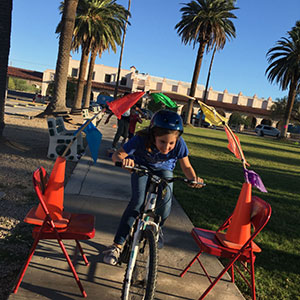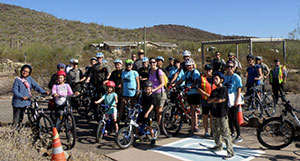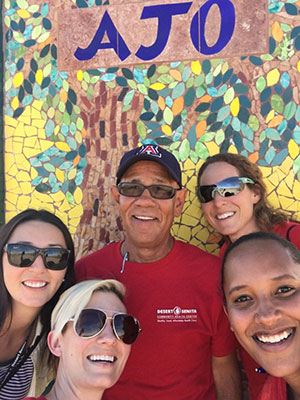Bike Ajo Program is Model for Rural Communities
A partnership meant to increase physical activity and prevent chronic disease has led to the creation of a community cycling center in Ajo, Arizona.
Lily Williams describes Ajo, Arizona as a trusting and safe town where you can see the stars at night. Her parents still live in the same house she grew up in. Located in western Pima County, the small rural community of Ajo is a former mining town with Organ Pipe Cactus National Monument for a backyard, and a total population of 3,165.

A child rides along a course at the Ajo Unified School District Bike Hub. (Photo courtesy of Bike Ajo)
Like many rural communities across the country, Ajo has its challenges. Recent studies found that 71 percent of families in Ajo are living below the federal poverty line and there is a 15 percent unemployment rate – both significantly higher than other areas within Pima County. Nearly half of the population identifies as Hispanic or Latino, a group that continues to experience significant chronic disease disparities such as diabetes and cardiovascular disease.
Data from the Ajo Unified School District shows that each grade had an obesity rate of at least 32 percent, with sixth grade reaching an alarming 57 percent.
"The residents of Ajo have significant disparities due to multiple social determinants of health including a lack of access to opportunities for physical activity and other resources necessary to prevent chronic disease,” said Martha Monroy, program manager and lecturer in the Department of Health Promotion Sciences at the University of Arizona Mel and Enid Zuckerman College of Public Health.
After 10 years of city living, Williams moved back home to Ajo with her husband and young daughter.
“So here I am back in my community ready to be involved but now a parent. How do I live a healthy lifestyle for both myself and my family in a community that I am learning has so much chronic disease? And since we are a community that is like family, how do we as a community come together and alter or even change our culture so that we can take advantage of what Ajo has to offer,” said Williams in a digital storytelling video for the Bike Ajo Coalition.
Monroy and colleagues applied for the Arizona Planning Association’s Plan4Health grant and with a dedicated group of people, the Bike Ajo Coalition was formed. Today, the town has two bike hubs open to children and their families, one located at the Ajo Unified School District and the other based at Desert Senita Community Health Center.

Bike Ajo and the Desert Senita Community Health Center hosted Bike & Hike in honor of National Diabetes Month in the Organ Pipe Cactus National Monument. (Photo courtesy of Bike Ajo)
This isn’t Monroy’s first ride around the block when it comes to building a coalition to create healthy communities. She worked with community partners to create the Bike Center at the Roy Drachman Clubhouse on Tucson’s South Side and the Docs on Bikes project in collaboration with the Department of Family and Community Medicine at the UA College of Medicine – Tucson.
The focus of Monroy’s research includes population health, women’s health, community health worker interventions, and the development of coalitions dedicated to the elimination of health disparities facing underserved populations. She is also the southwest regional director of the National Racial and Ethnic Approaches to Community Health Coalition Board of Directors, a national program administered by the Centers for Disease Control and Prevention to reduce racial and ethnic health disparities.
In addition to 40 bicycles, Bike Ajo provides, helmets, education on bicycle safety for recreation and transportation, trains local community members on bicycle repair, provides resources for bicycle repair and maintenance, certify community members as League-Certified Cycling Instructors, and the annual community bike and hike at Organ Pipe National Monument.
Donna Lewandowski, bicycle and pedestrian program coordinator for the Arizona Department of Transportation, and a student in the Master of Public Health program at the Zuckerman College of Public Health, worked with Monroy on every phase of the project. Fellow public health graduate students worked on the first phase of the plan, a community assessment. The students conducted a bike-ability assessment and community survey that was completed by more than 70 community members and included questions on health status and barriers to bicycling.
The assessment revealed a desire to promote eco-tourism in Ajo through mountain biking, which is a promising endeavor as an estimated 13 percent of all spending on outdoor recreation trips in the U.S. is spent on bike trips, according to the Outdoor Industry Association.

Clockwise from left: Lily Williams and Oscar Reyes, employees of the Desert Senita Community Health Center in Ajo, and Jaze Butler; front row: Amanda Rodgers and Christina Azzolina, Master of Public Health alumnae from the Mel and Enid Zuckerman College of Public Health.
Ada Wilkinson-Lee, associate professor in the Department of Mexican American Studies at the College of Social and Behavioral Sciences, handled the evaluation phase of the Bike Ajo program. She is a frequent collaborator on UA Zuckerman College of Public Health community based research and outreach programs.
The coalition distributed mountain bike trail maps on partner websites and via bike shops in Pima County to start promoting Ajo as a mountain biking destination. As a result of the assessment, 24 community members have shown interest in joining the coalition and others have volunteered to become League Certified Bicycle Instructors to increase the community’s capacity to provide road safety classes.
Bike Ajo is so successful that the Desert Senita Community Health Center, a federally qualified health center providing primary care health services in Ajo and Arizona City, received the award for Excellence in Person and Family Engagement from the Centers for Medicare & Medicaid Services for their leadership in Bike Ajo and the separate Edible Ajo program.
“By building a sustainable bike hub for the community, Ajo will be able to leverage this capacity to create economic growth through cycling. We hope to create a replicable model for other rural communities interested in embracing cycling for transportation, recreation, and as an economic driver,” said Monroy.
The Bike Ajo Coalition members include community health workers and Ajo residents, the Ajo Chamber of Commerce, the Ajo Unified School District, the Arizona Chapter of the American Planning Association, the American Public Health Association, the Desert Senita Community Health Center, the International Sonoran Desert Institute, the Pima County Department of Transportation, Pima County Parks & Recreation, the Pima County Health Department, the Zuckerman College of Public Health, and the Department of Mexican American studies.

